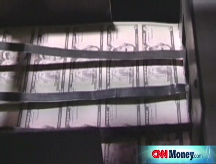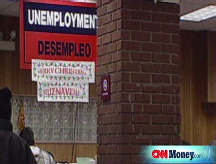How to tell it's finally over
Another day, another big market plunge. The market may be close to bottoming out, but more pain is probably still ahead.
NEW YORK (CNNMoney.com) -- Stocks plunged again Friday. Ugh! It's getting more difficult by the day to maintain that the worst may be over.
Economists, market strategists, investors and financial columnists like yours truly have been burned repeatedly trying to call the bottom of the market.
So let's ask a different question: How much longer can this intense volatility go on?
Phil Orlando, chief equity market strategist with Pittsburgh-based money manager Federated Investors, said he thinks stocks need to come close to the bear market lows from 2002 before he'd feel that the selling is done.
Orlando said the S&P 500, trading at around 870, would have to fall another 8% to 11%, to around 770 to 800.
"We're getting close but we're not there yet. When the market comes down into that range then I'd be more confident that stocks can stabilize," Orlando said. "At that point, the market will be pricing in a deep recession and may begin to discount an economic recovery that can start in the middle of next year."
Others agree that another wave of selling is probably yet to come. And the big reason is that many struggling hedge funds that made ill-timed bets on stocks, currencies and commodities are probably facing massive redemptions, i.e. calls for cash from their investors.
"The performance for many hedge funds has not been good. It's realistic to say a lot of portfolios were not positioned for slowing growth, let alone a recession," said Subodh Kumar, an independent market strategist based in Toronto. "Hedge funds are taking the opportunity to liquidate their holdings."
Hedge funds, unlike many other institutional investors, often don't have the option of sitting tight and investing for the long-term with a buy-and-hold strategy. So when managers are facing big redemptions, they may be forced to dump investments regardless of whether or not they are at a loss or profit.
"If you are a hedge fund manager, you are not going to wait around for prices to get better. You don't have the luxury of months," said David Joy, chief market strategist with RiverSource Investments in Minneapolis.
With that in mind, many hedge funds may not be able to survive this crisis. The murky and largely unregulated hedge fund industry is a major player in the world's financial markets.
Orlando estimates that some 10,000 hedge funds control $2 trillion in assets. Those figures will be a lot lower when all is said and done.
"When this finally shakes out, the hedge fund industry will look a lot different. We could lose half of the hedge funds, mostly little players," he said. "Many of the big guys will be fine but smaller marginal players will get shaken out."
The good news, if you could call it that, is that the unwinding could be finished soon. But it won't end just because of today's sell-off.
"This can't be a long-lasting phenomenon. Pressure is intense right now so this will not be a dragged out type of event. I think it would have to be accomplished in a matter of weeks," Kumar said.
Joy shared that assessment.
"The intensity of the selling should abate sooner rather than later. But it would be nice if it was more orderly," he said.
And Orlando said that once the major selling pressure has finally subsided, investors will hopefully realize that there are a lot of bargains out there and that the economy will eventually get back on track thanks to moves by the Federal Reserve, other central banks and the Treasury Department.
"The market is doing a terrific job of pricing in Armageddon, but that scenario is off the table because of the bold and creative steps that the Fed and Treasury Department have taken," he said. "That leaves us not with Armageddon but a recession. And recessions end. At some point, investors have to realize that and prepare for an upturn."
Yes, the initiatives taken by Fed chairman Ben Bernanke and Treasury Secretary Henry Paulson to try and restore confidence in the banking system have yet to have an immediate positive impact. But that does not mean that they won't work over the long haul.
"None of these programs will do anything for the economy and markets today," Orlando said. "We will be in a lot better shape nine months from now. But nine months doesn't satisfy the immediate gratification of the hedge fund industry."
Kumar added that sentiment has swung from being overly optimistic last year to excessively pessimistic now. Eventually, some rationality should return.
"The market is very bipolar. Last year, people looked at credit and saw no problems. Right now, people see nothing but problems. The reality lies somewhere in between," he said.
So once again, it all comes back to the philosophy of buying low and taking a longer-term approach: investing not trading. Even though stocks may still have room to fall over the next few weeks or months, Joy said he is confident enough to have his firm start dipping its toes back into the markets again.
"Stocks are attractive. Many high quality companies have dividend yields that are higher than bonds," he said. "We've begun to put money back to work in the last week incrementally. This may not pay off for a while but ultimately we will get rewarded." ![]()




